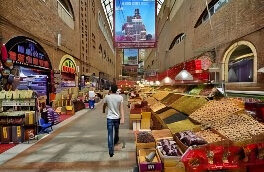Islamabad, Sep8: When Pakistani delegates visited the International Grand Bazaar in Urumqi, the capital of the Xinjiang Uygur Autonomous Region, they were enthralled by the modern Chinese technology and handicrafts from Pakistan.
Senior PTV reporter Arbab Ali Asghar commented, “I was surprised to see handicrafts from my hometown here,” as he made a visit at a Pakistani store in the bazaar. The store offered pendants made of jade, carved copper vases, handcrafted brass lamps, and other Pakistani artisan goods.
Ahtar Hussain, a Pakistani businessman who has resided in Xinjiang for more than 30 years, runs the store, which provides a special bridge between Chinese and Pakistani cultures. Hussain has been operating his company at the Grand Bazaar for about twenty years. He is married to a woman from Xinjiang. Speaking Chinese with ease, On the pedestrian street, he frequently attends Dawaz (aerial tightrope walking) performances.
China and Pakistan have had a long history of trading along the Silk Road, going all the way back to the Han Dynasty. Now, taking advantage of contemporary trade, Hussain has dabbled in live streaming to promote Pakistani goods to clients abroad, including those in China, the US, France, and Japan, With more than 3,000 businesses, the International Grand Bazaar in Xinjiang welcomes over 200,000 tourists every day. During his visit, Daily Ittehad’s Deputy Editor-in-Chief Maarij Farooq bought handcrafted scarves and a fridge magnet in the manner of Xinjiang.
“The quality of the goods here is better than those sold locally in Pakistan,” he stated, expressing optimism that Pakistan’s increased trade cooperation with China would enable it to create comparable high-quality goods soon.
During their visit to the Xinjiang Software Park, Pakistani delegates were not only shown high-tech inventions but also handicrafts. They investigated cutting edge technology for cattle ranching, including as the BeiDou Satellite Navigation System (BDS). With the help of this Narrowband Internet of Things (NB-IoT) technology, herders can keep an eye on cattle remotely by tracking their positions and vital signs.
Additionally, iFLYTEK smart translators, Tianyu BDS ID cards, and handheld satellite messengers were tested by Pakistani representatives. As Maarij Farooq said, “I assumed that such high-tech industrial parks were only found in places like Shenzhen or Shanghai before moving to Xinjiang. I was surprised to see them here.
As the tenth anniversary of the China-Pakistan Economic Corridor (CPEC) approaches, the two nations’ collaboration is growing, especially in the industrial and technology domains. More Pakistani businesses are expected to open up shop in the Xinjiang Software Park soon, according to Yasir Habib Khan, the founder and president of the Institute of International Relations and Media Research.
The potential in the region was emphasized by Xu Xiang, Senior Engineer of the Economic and Technological Development Zone of Urumqi, namely in the Digital Development Bureau. “We already sell some of our high-tech equipment and products to Central and South Asia. Our goal is to establish a new “information avenue, “extending Xinjiang’s software and information services and fostering traditional trade ties,” he stated.









